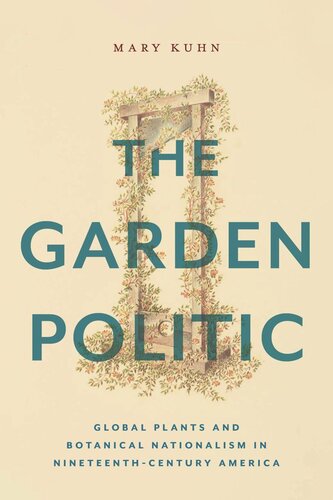

Most ebook files are in PDF format, so you can easily read them using various software such as Foxit Reader or directly on the Google Chrome browser.
Some ebook files are released by publishers in other formats such as .awz, .mobi, .epub, .fb2, etc. You may need to install specific software to read these formats on mobile/PC, such as Calibre.
Please read the tutorial at this link: https://ebookbell.com/faq
We offer FREE conversion to the popular formats you request; however, this may take some time. Therefore, right after payment, please email us, and we will try to provide the service as quickly as possible.
For some exceptional file formats or broken links (if any), please refrain from opening any disputes. Instead, email us first, and we will try to assist within a maximum of 6 hours.
EbookBell Team

5.0
38 reviewsHow worldwide plant circulation and new botanical ideas enabled Americans to radically re-envision politics and society
The Garden Politic argues that botanical practices and discourses helped nineteenth-century Americans engage pressing questions of race, gender, settler colonialism, and liberal subjectivity. In the early republic, ideas of biotic distinctiveness helped fuel narratives of American exceptionalism. By the nineteenth century, however, these ideas and narratives were unsettled by the unprecedented scale at which the United States and European empires prospected for valuable plants and exchanged them across the globe. Drawing on ecocriticism, New Materialism, environmental history, and the history of science—and crossing disciplinary and national boundaries—The Garden Politic shows how new ideas about cultivation and plant life could be mobilized to divergent political and social ends.
Reading the work of influential nineteenth-century authors from a botanical perspective, Mary Kuhn recovers how domestic political issues were entangled with the global circulation and science of plants. The diversity of Harriet Beecher Stowe’s own gardens contributed to the evolution of her racial politics and abolitionist strategies. Nathaniel Hawthorne’s struggles in his garden inspired him to write stories in which plants defy human efforts to impose order. Radical scientific ideas about plant intelligence and sociality prompted Emily Dickinson to imagine a human polity that embraces kinship with the natural world. Yet other writers, including Frederick Douglass, cautioned that the most prominent political context for plants remained plantation slavery.
The Garden Politic reveals how the nineteenth century’s extractive political economy of plants contains both the roots of our contemporary environmental crisis and the seeds of alternative political visions.